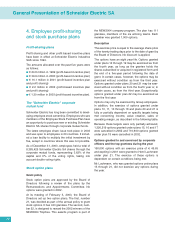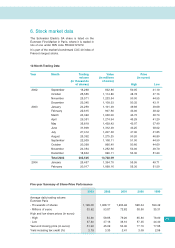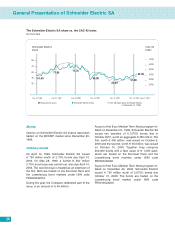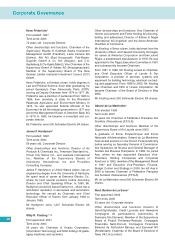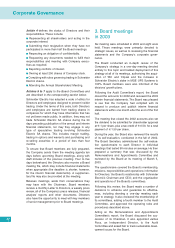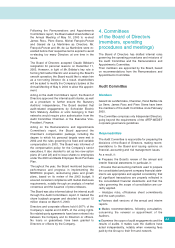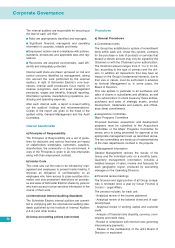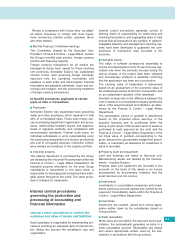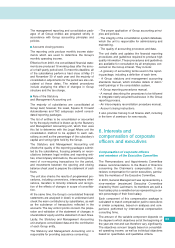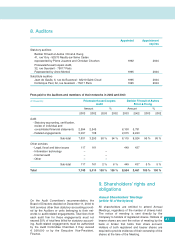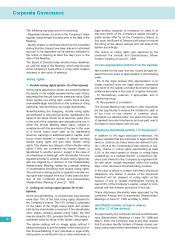APC 2003 Annual Report Download - page 34
Download and view the complete annual report
Please find page 34 of the 2003 APC annual report below. You can navigate through the pages in the report by either clicking on the pages listed below, or by using the keyword search tool below to find specific information within the annual report.
Article 4
defines the status of Directors and their
responsibilities. These include:
■Representing all shareholders and acting in the
corporate interest.
■Submitting their resignation when they have not
participated in more than half the Board meetings.
■Respecting an obligation of confidentiality.
■Requesting any documents needed to fulfill their
responsibilities and meeting with Company execu-
tives as required.
■Reporting conflicts of interest.
■Owning at least 250 shares of Company stock.
■
Complying with rules governing trading in Schneider
Electric shares.
■Attending the Annual Shareholders’ Meeting.
Articles 5 to 7 apply to the Board Committees and
are described in the corresponding section below.
Schneider Electric has adopted a code of ethics for
Directors and employees designed to prevent insider
trading. Under the terms of this code, both Directors
and employees are barred from trading shares in
companies for which they have information that has
not yet been made public. In addition, they may not
trade Schneider Electric SA shares during the 30
days preceding publication of the annual and interim
financial statements, nor may they engage in any
type of speculative trading involving Schneider
Electric SA shares. This includes margin trading,
trading in options and warrants and purchasing and
re-selling securities in a period of less than four
months.
To ensure that Board members are fully prepared,
the Company sends them the meeting agenda ten
days before upcoming Board meetings, along with
draft minutes of the previous meeting. Four to five
days beforehand, the Directors also receive a Board
meeting file, which may include financial statements
when appropriate (the deadline is shorter, however,
for the interim financial statements). A supplemen-
tary file may also be provided at the meeting.
Between meetings, aside from conversations they
may have with the Chairman, Board members
receive a monthly Letter to Directors, a weekly press
review, all of the Company’s press releases, financial
analysts’ reports and other documents. Directors
also have the opportunity to meet with key members
of senior management prior to Board meetings.
3. Board meetings
in 2003
Six meeting were scheduled in 2003 and eight were
held. These meetings were primarily devoted to
strategic issues, as well as to reviewing the financial
statements and the Company’s corporate gover-
nance.
The Board conducted an in-depth review of the
Company’s strategy in a one-day meeting devoted
entirely to this topic and tracked deployment of this
strategy at all of its meetings, authorizing the acqui-
sition of TAC and Clipsal and the increase in
Schneider Electric’s stake in MGE UPS Systems to
100%. Board members were also informed of the
divisions’ growth plans.
Following the Audit Committee’s report, the Board
closed the accounts for 2002 and reviewed the 2003
interim financial statements. The Board was pleased
to see that the Company had complied with its
request to produce and publish interim financial
statements within one month after the end of the first
half.
The meeting that closed the 2002 accounts also set
the dividend to be submitted for shareholder approval
at € 1 per share, plus a tax credit of € 0.50, for a total
payment of € 1.50 per share.
During the year, the Board also reviewed the results
of its self-evaluation, conducted in the fall of 2002.
The Board Secretary administered the self-evalua-
tion questionnaire to each Director in individual
meetings that lasted 90 minutes on average. He then
prepared a summary that was discussed by the
Remunerations and Appointments Committee and
reviewed by the Board at its meeting of March 5,
2003.
The questionnaire covered the Board’s membership,
missions, responsibilities and operations; information
for Directors; the Board’s relationship with Schneider
Electric’s Chairman and CEO; and the organization
and operations of the Board’s committees.
Following this review, the Board made a number of
decisions to enhance and guarantee its effective-
ness, including devoting a one-day meeting each
year to strategy. It also reviewed the membership of
its committees, adding a fourth member to the Audit
Committee, and approved the operating rules and
procedures described above.
Acting on the Remunerations and Appointments
Committee’s report, the Board discussed the suc-
cession of its Chairman. It also appointed James
Ross, an Independent Director, to the Audit
Committee and asked him to track sustainable devel-
opment issues for the Board.
Corporate Governance
32


